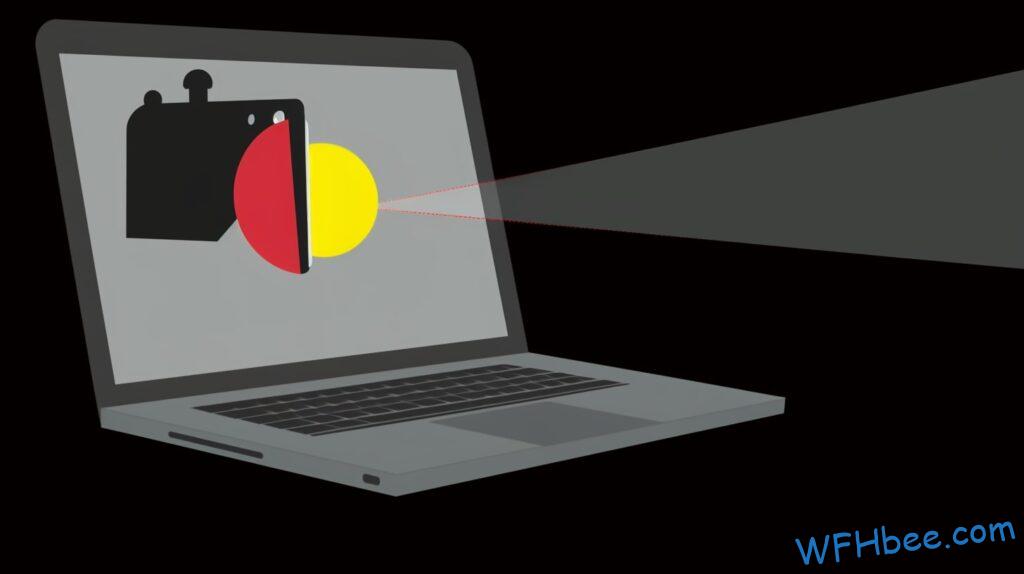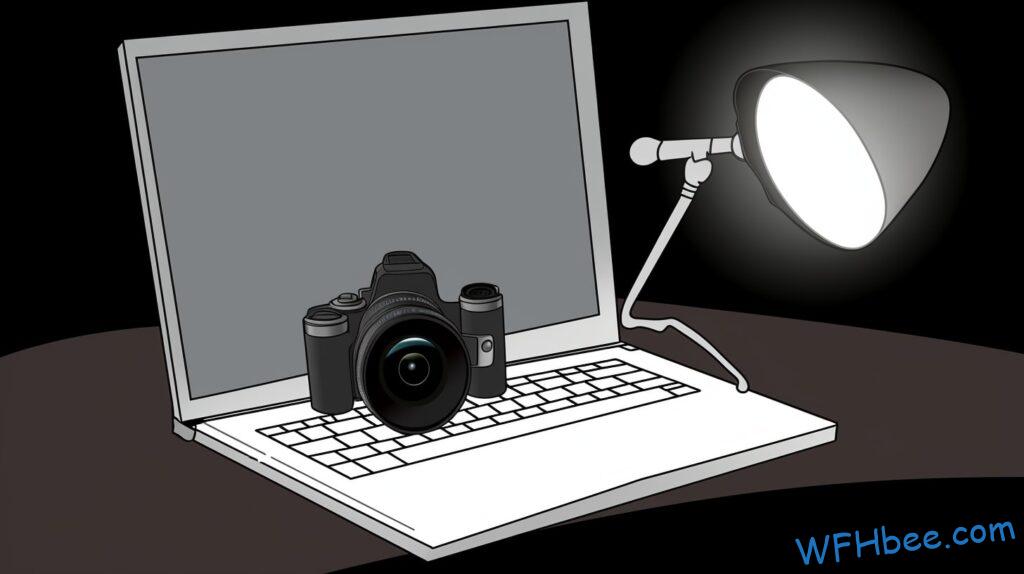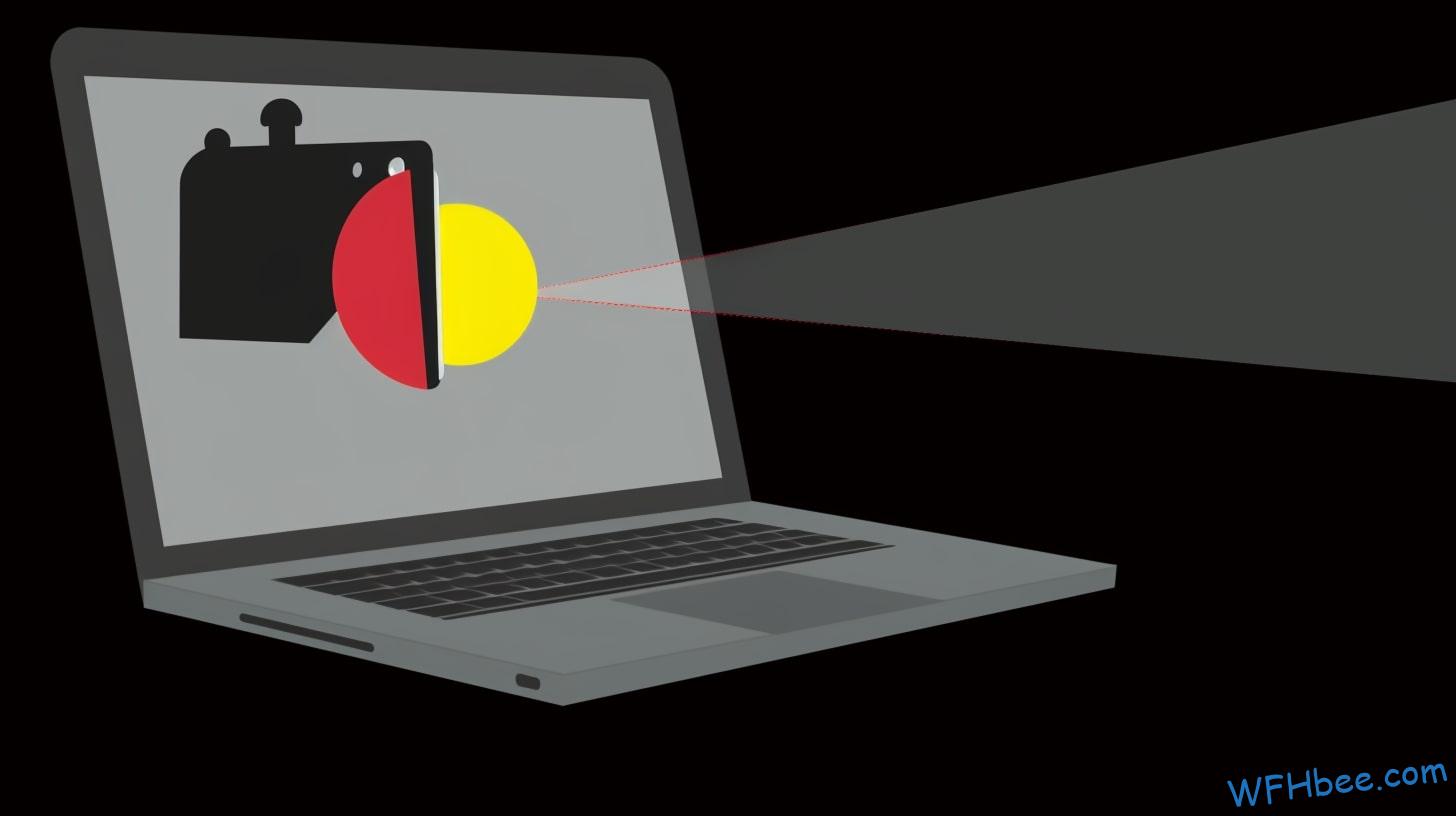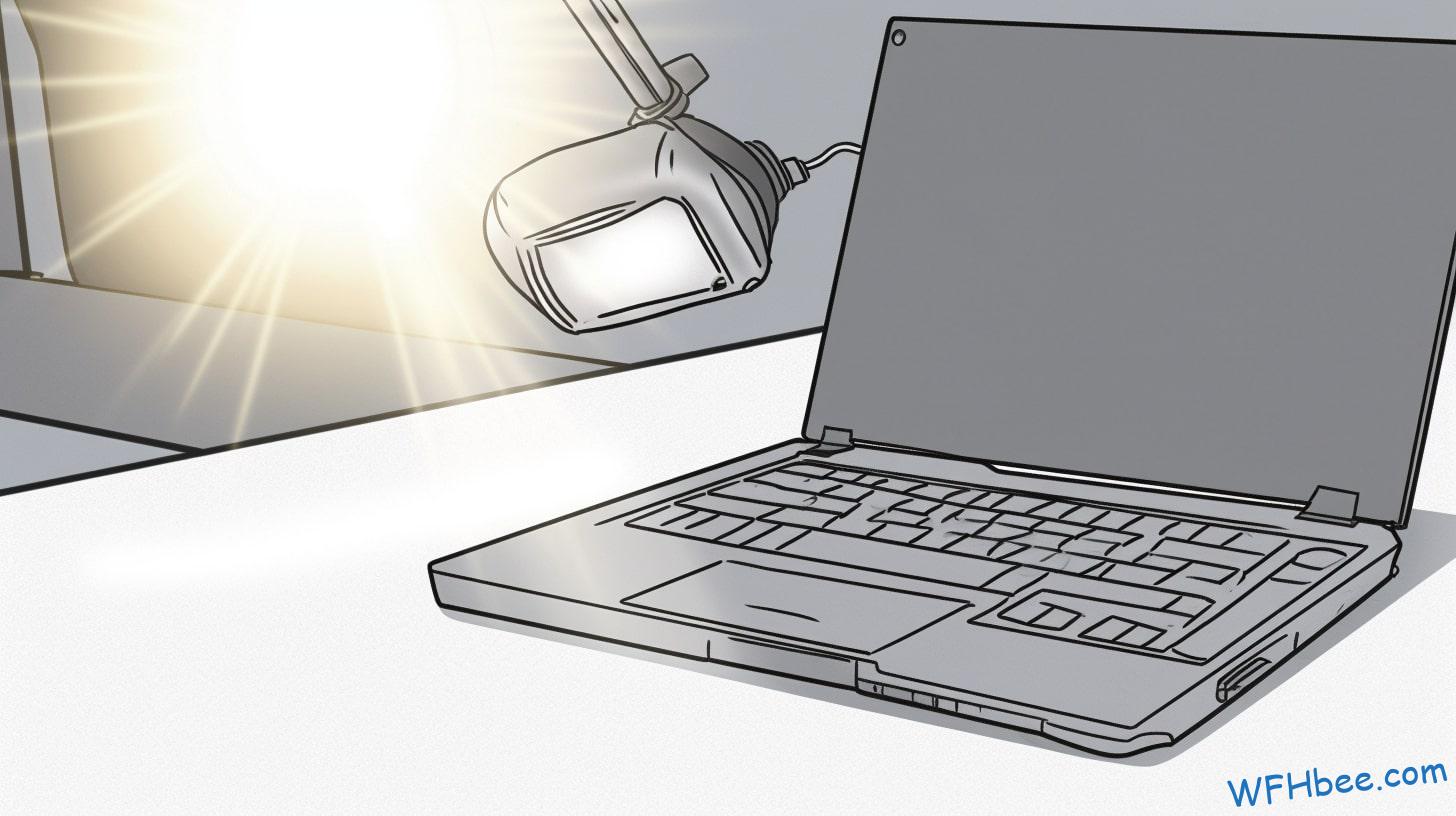With the rise of remote work, many employers are considering monitoring their employees with laptop cameras and other surveillance methods to ensure productivity. But is this practice legal?
Remote work has become increasingly popular over the last few years due to its convenience, cost savings, and flexibility. However, some employers have raised concerns about how they will be able to keep track of their workers and guarantee that tasks are completed in a timely manner.
This begs the question: Is it permissible for an employer to monitor their staff through laptop cameras or any other type of surveillance technology? We’ll discuss this issue in depth in order to provide readers with all the necessary information needed to make informed decisions regarding employee monitoring practices.

Overview Of Surveillance Technology
In the modern world, surveillance technology has become a necessary evil. As data security continues to be threatened by cyber-attacks, organizations have adopted measures such as remote access and video conferencing in order to ensure privacy policies are not breached. However, these software and hardware solutions still come with ethical implications that must be addressed.
For example, when it comes to monitoring remote employees on their laptop cameras, there’s an obvious breach of trust involved which can lead to feelings of uneasiness among workers if they feel they are being spied upon without consent. This means employers need to consider using other methods of communication whenever possible, or at least make sure their goals for recording conversations align with the respective employee’s expectations before any type of camera is activated.
These concerns about surveillance technology are understandable since companies should strive for transparency in all aspects related to employee tracking and data storage protocols. It’s essential that businesses create secure environments where individuals feel safe from unnecessary intrusion into their personal lives.
With this in mind, we now turn our attention to the laws governing surveillance technology and the potential repercussions associated with its misuse.

Laws Governing Surveillance Technology
Employees have the right to data privacy and a safe work environment, but employers are increasingly using surveillance technology as a way of monitoring their employees. Tracking methods such as laptop cameras, AI ethics protocols, employee tracking software, and other forms of workplace monitoring can raise serious questions about civil rights in the workplace.
- Data privacy laws should be established that protect employees from unauthorized access to personal information and communications while they are at work.
- Surveillance technology should only be used when there is reasonable suspicion of wrongdoing or potential safety risks within the workplace.
- Employers must ensure that any surveillance technologies they use respect an employee’s right to privacy by limiting access to certain areas of the workplace or specific workspace activities.
The implementation of surveillance technologies for employee monitoring has both ethical implications for companies as well as legal ramifications for those who violate these regulations. With clear guidelines in place outlining what type of surveillance is acceptable, employers can create a safer working environment without infringing upon their employees’ freedoms and rights to data privacy.
It is important to remember that no matter how advanced our technology becomes, protecting human rights will always come first. This leads us naturally into exploring employers’ rights regarding surveillance technology in more detail.

Employers’ Rights Regarding Surveillance Technology
Employers have the right to monitor their employees’ activities, whether they are in an office or working remotely. However, it can be difficult for employers and workers alike to understand exactly how much monitoring is appropriate. Pros of surveillance technology include increased data security and improved productivity, but these come with potential drawbacks such as a lack of privacy rights for remote workers. Companies should put into place opt-out policies that allow employees to decide when and where they wish to be monitored.
Surveillance technology has both advantages and disadvantages for employers and employees. On one hand, it can help protect sensitive information from being leaked, ensure compliance with regulations, improve efficiency by tracking employee performance, and provide proof of any misconduct on the job. On the other hand, it can lead to feelings of distrust between employer and employee if proper protocols aren’t followed or expectations weren’t made clear beforehand. This can also cause some people to feel like they’re being watched constantly while working remotely, which could result in decreased morale over time.
It’s important for companies who use surveillance technology to establish clear guidelines regarding its use so everyone understands what is expected from them. Employers should communicate openly about why certain technologies are necessary and discuss with their teams any potential concerns related to privacy rights before implementing any kind of monitoring system.
By taking this approach, businesses not only create a better work environment for all involved parties but also make sure that data remains secure at all times.
With that said, let us transition now into exploring employee rights regarding surveillance technology.

Employee Rights Regarding Surveillance Technology
Employees have the right to expect a certain level of privacy in their workplace. As technology evolves, it is important for employers to understand how data privacy and AI tracking can be used ethically when monitoring employees.
While biometric data, workplace monitoring, and digital surveillance are all powerful tools that businesses can use for productivity purposes, they must also consider employee rights before implementing any type of system or policy.
The ethical considerations of such technologies should always be taken into account. If an employer plans on using remote cameras to monitor employees, the potential invasion of personal space needs to be weighed against the organization’s goals.
Additionally, companies need to ensure that there are clear boundaries regarding what types of surveillance are acceptable within the company and make sure that these guidelines are communicated properly with all staff members.
When considering whether or not to deploy workplace surveillance systems, organizations must remember that while they may provide some benefits in terms of increased productivity and safety measures, they can also cause distress among workers who feel like their privacy is being violated.
For this reason alone, many companies opt out from using such systems altogether as it could lead to legal repercussions if done improperly. With that said, transitioning into an ethical discussion about the implications of such technologies on our daily lives is essential for creating a safe work environment for everyone involved.

Ethical Considerations Of Surveillance Technology
The surveillance technology of today is a silent watchman, casting its unblinking eye across the digital landscape. It has become an ever-present companion that follows our every move, recording and analyzing our every click.
From camera tracking to AI algorithms, this technology can be used for good or ill but it always prompts questions about data privacy and systemic bias:
- How much personal information are we comfortable with companies collecting?
- What safeguards exist against misuse of data collected by these tools?
- Is there a way to ensure algorithmic fairness so as not to create further divides in society?
As citizens living in an increasingly connected world, it’s important that conversations around the ethics of surveillance continue. We must ask hard questions and demand answers from those who wield power over us if we want to protect ourselves from exploitation – both online and off.

The Drawbacks Of Surveillance Technology
Like any technology, surveillance may come with unintended consequences. It’s important to consider the potential drawbacks before jumping on board the surveillance bandwagon. To paint a picture of what this could look like in practice, let’s explore some of the privacy implications, safety risks and data security issues associated with wide-ranging monitoring techniques.
The most obvious concern is that employers can invade employee’s personal space if laptop cameras are used for remote working. This flies in the face of individual autonomy as it creates an environment where people feel forced to comply or risk losing their job.
Furthermore, employees might feel too intimidated to speak out against certain decisions due to fear of retaliation from those who are watching them behind closed doors. On top of that, there’s no guarantee that data collected won’t be mishandled or misused by companies seeking to exploit its workforce – something which could lead to disastrous outcomes.
When viewed holistically, these problems suggest a clear downside to creating a surveillance culture in the workplace: not only do you have fewer rights when your employer knows exactly what you’re doing every second of every day but also you must trust them implicitly not to misuse said information against you down the line.
With such considerations in mind, alternatives should certainly be explored before computers become tools for constant monitoring and control within organizations.

Alternatives To Surveillance Technology
Surveillance technology can be a powerful tool, but it comes with drawbacks that should not be overlooked. While AI monitoring and remote tracking may help employers to keep track of their employees’ productivity, they also come at the cost of digital privacy and pose the risk of covert surveillance. Facial recognition is particularly concerning in this regard since it allows employers to monitor employee behavior without their consent or knowledge.
Fortunately, there are alternatives to such invasive techniques which allow businesses to ensure productivity while respecting the rights of their employees. For instance, some companies have taken advantage of anonymous data collection tools to measure performance metrics without resorting to direct observation. This method offers an effective way for employers to determine how well an employee is doing without infringing on their right to privacy.
Additionally, open communication between employer and employee should be encouraged as a means for staying informed about progress without relying solely on surveillance technology.
When considering how best to protect both business interests and those of its workers, implementing measures like these can provide greater satisfaction for all parties involved. Employers should strive to find balance between ensuring efficiency and protecting worker autonomy by embracing methods that avoid intrusive tactics while providing meaningful feedback on job performance.

Best Practices For Employers Using Surveillance Technology
Like a hawk soaring above its prey, employers have the ability to watch their remote employees with technological oversight. In an era where cameras are increasingly being used for surveillance in the workplace, it is essential for companies to be aware of the ethical considerations and privacy implications that accompany such monitoring.
Employers must recognize that employee monitoring has both benefits and drawbacks, and as such should ensure they foster company culture which respects individual’s rights to privacy. Here are some key points when considering how best to use this technology:
- Respect Employees’ Privacy: Asking permission before collecting data on your employees will help ensure their sense of safety & security while working.
- Implement Policies Appropriately: Create clear policies regarding what type of information can be collected through camera surveillance and when/how it will be monitored or reviewed.
- Maintain Transparency: Ensure employees understand why they are being monitored, what data is being collected, and how long it will be retained – all without compromising their right to privacy or confidentiality.
The implementation of these guidelines can play a crucial role in creating an atmosphere that values personal autonomy while providing necessary protection from potential abuse or misuse of power by employers due to lack of transparency. This balance between freedom and structure helps build trust in any organization – trust that creates lasting relationships between employer and employee.
Now onto understanding best practices for employees who may find themselves under technologically driven scrutiny…

Best Practices For Employees Being Monitored
Monitoring employee activity through laptop cameras can have significant implications on accuracy vs. privacy, employee morale, and data security.
On one hand, employers may feel they need to keep a closer eye on their remote employees in order to ensure that tasks are being completed accurately and deadlines are met without disruption. However, this type of surveillance could also lead to an uncomfortable working environment where the constant feeling of being watched leads to decreased motivation and productivity among workers.
Additionally, there is always the risk of data breaches or other forms of cyberattacks if employers do not take measures to protect their networks from external threats as well as internal ones.
The potential legal implications of such monitoring techniques must also be taken into account when deciding whether or not it is appropriate for a particular organization’s situation. Employers should consider any liabilities associated with collecting and storing personal information about individual employees—not just those who work remotely—and make sure that all policies regarding surveillance comply with applicable laws and regulations.
Furthermore, companies should strive to maintain an atmosphere of trust between management and staff so that everyone feels comfortable collaborating effectively regardless of where they are located.
Ultimately, it is essential for businesses to weigh the pros and cons carefully before implementing any kind of monitoring system involving laptop cameras or other technology used by remote employees. Taking these factors into consideration can help create a productive workplace while minimizing any negative effects on both employer liability and worker morale. With this in mind, let’s explore the potential legal implications of surveillance technology in more detail.

Potential Legal Implications Of Surveillance Technology
Imagine a world not too dissimilar from our own. In this world, there is an ever-growing presence of surveillance technology in the workplace. It’s everywhere: cameras that record every movement, data systems that collect and store information, tracking devices that can follow you anywhere.
On its face it seems like a dystopia – employers have complete control over their employees, ensuring productivity and orderliness by monitoring them at all times. And when we look deeper into the implications of these technologies on employee privacy and security, we find an even darker side to this system.
The reality is that many employers are using intrusive methods of surveillance without informing their workers or obtaining consent forms. This lack of transparency has serious consequences for employee relations as well as potential legal issues surrounding data security and privacy laws.
Here are some key points to consider when evaluating the use of such technologies in the workplace:
- Privacy implications: Is your employer respecting your right to privacy?
- Data Security: Are your sensitive records safe from unauthorized access?
- Monitoring Methods: How exactly is your employer monitoring you?
- Consent Forms: Has your employer obtained written consent before collecting any personal data?
Employers must be aware of these critical elements if they choose to enforce surveillance technology within their workplaces; otherwise they risk violating multiple ethical and legal standards while eroding trust between management and staff alike.
By taking these measures seriously, companies can ensure that everyone involved is treated fairly and with respect — essential components for any successful business model. With this understanding in place, we can move forward towards examining the impact of surveillance technology on remote work.

The Impact Of Surveillance Technology On Remote Work
The potential legal implications of surveillance technology are vast, and the impact on remote work is even more significant. As businesses continue to rely heavily on virtual meetings and online monitoring, data privacy must be taken into account in order to protect employees’ rights. Companies must consider safety protocols that ensure their workforce remains secure from malicious actors while still providing the necessary security measures for their organization.
At the same time, employee morale should remain a priority when implementing any kind of team monitoring software or hardware. Employees need to feel comfortable with their employer’s policies regarding surveillance technology and trust that their private information will not be accessible by anyone without permission. This will help ensure teams maintain high productivity levels during this period of remote work.
But what about watching remote employees through laptop cameras? The answer depends largely on whether the company has implemented appropriate internal policies as well as local laws covering workplace surveillance activities. If employers adhere to these regulations, then they may have a chance at legally utilizing such tools – but ultimately it comes down to how those tools are utilized and applied within an organization’s context.
Allowing remote workers some degree of autonomy can lead to improved communication among teams and greater job satisfaction overall. Ultimately, there is no one-size-fits-all approach when considering if it is legal watching remote employees via laptop camera – careful consideration and research should always come first before making any decisions.
Moving forward, understanding how surveillance technology affects both business operations and employee wellbeing is essential in finding a balance between security needs and personal liberties.

Conclusion
The issue of watching remote employees on laptop cameras is a delicate one, and it should be considered carefully. Data privacy laws can make the legality of this practice difficult to navigate in some cases, and there are potential security risks that must also be taken into account. Not only do these considerations affect the legal implications of monitoring remote workers; they also have an effect on employee morale and trust issues between employers and their staff.
When deciding whether or not to monitor remote employees with camera footage, data privacy regulations must always take precedence. Making sure that any video surveillance complies with relevant laws is essential for protecting both the employer and its workers from unwanted repercussions down the line.
Furthermore, organizations should consider investing in additional security measures such as two-factor authentication and firewalls to protect against potential breaches of confidential information which could arise if unauthorized individuals gain access to video recordings.
Observing remote employees through cameras may seem like an effective way to ensure productivity but doing so without taking proper precautions carries many risks. Companies need to evaluate all aspects involved before implementing any sort of video surveillance system – including assessing if it’s even necessary in the first place – so everyone involved feels safe and respected while working remotely.
Author: Robin Borg
Hi, I’m Robin. I have been working from home at least one day a week during all of my adult life. I have a background in research and data science. Get to know me better in the About page.







